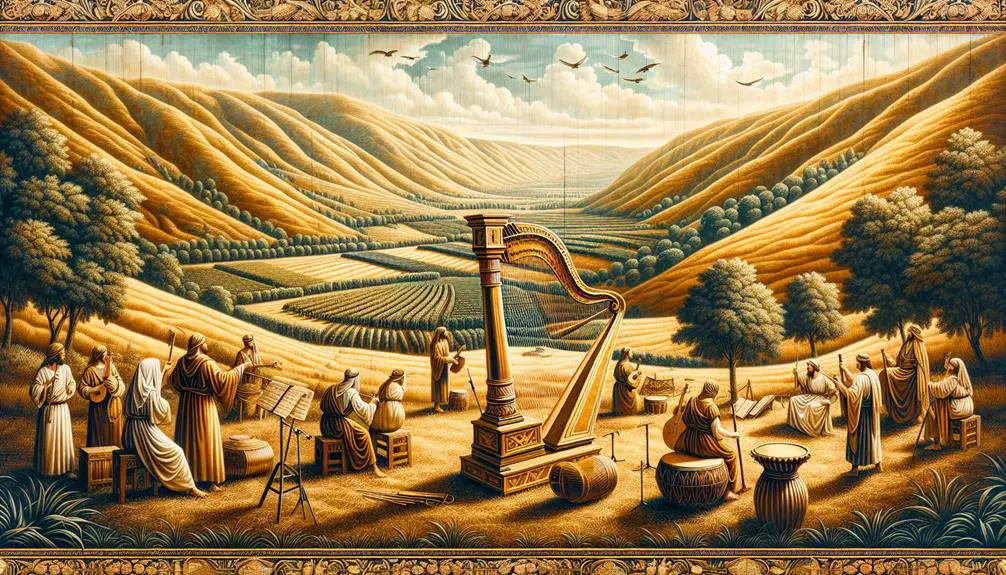Navigate the enigmatic world of 'Gittith' in the Bible, where ancient music and mystery collide, sparking endless curiosity and debate.
Gittith in the Bible
In the tapestry of biblical literature, 'Gittith' appears as a mysterious thread, woven subtly into the fabric of Psalms. You might have skimmed over it, not pausing to ponder its origin or significance.
Originating from Gath, this term carries with it a rich historical and possibly musical heritage, yet its precise meaning remains a topic of spirited debate among scholars. As you explore its occurrences within the Psalms, you'll uncover layers of interpretation that bridge ancient musical traditions and symbolic meanings.
The quest to unravel the enigma of Gittith invites you to immerse yourself in a journey through time, uncovering its impact on both past and present cultures. Why does this ancient term still capture the imagination of theologians and historians alike? The answer lies just beneath the surface, waiting for you to uncover.
Key Takeaways
- Gittith refers to a musical term or instrument linked to ancient Hebrew worship in the Psalms.
- The term's origin and exact meaning remain debated, with connections to Gath and possible musical genres or instruments.
- Its presence in Psalms suggests a special musical setting or mood, enhancing the spiritual and emotional depth of worship.
- Understanding Gittith offers insights into ancient music's influence on biblical worship practices and cultural traditions.
The Meaning of Gittith

The term 'Gittith' in the Bible, often associated with musical direction, originates from the Hebrew word suggesting a connection to Gath, a Philistine city known for its production of wine and musical instruments. Delving into Gittith etymology, you'll find that scholars have debated its precise meaning, but the consensus leans towards it being either a type of instrument crafted in Gath or a musical genre or style that originated there. This connection implies a cultural exchange or influence that transcends mere geographical proximity, highlighting the significance of Gath in the ancient world's musical landscape.
Gittith variations in biblical texts further complicate its interpretation. These variations could indicate different types of instruments, or perhaps different musical modes or scales associated with Gath, suggesting a rich musical tradition that has been somewhat obscured by the passage of time. The analytical approach to understanding Gittith underscores the importance of context and cultural intersections in biblical studies. By examining the term through the lens of etymology and variations, you gain insights into the multifaceted world of ancient music and its influence on religious practices.
Gittith in Psalms Explained

You'll find that Gittith holds a significant musical connection within the Psalms, tethering ancient melodies to sacred texts.
Specifically, Psalms featuring Gittith not only enrich our understanding of biblical worship practices but also underscore the instrument's role in conveying spiritual themes.
This exploration into the Psalms offers a detailed look at how Gittith's presence enhances the lyrical and emotional depth of these religious hymns.
Gittith's Musical Connection
Delving into the Psalms, 'Gittith' signifies a unique musical connection, often linked to a type of stringed instrument that was historically used in Hebrew worship. This instrument's distinct sound stemmed from specific string tuning techniques that were meticulously developed to enhance its harmonic capabilities.
The tuning not only defined its sonic character but also influenced the performance practices associated with its use. Musicians adept in these practices were highly regarded, as their skill determined the emotional and spiritual impact of the worship. Understanding Gittith's role illuminates the sophistication of ancient Hebrew musical tradition, revealing a deep intertwining of technical mastery and religious expression.
This insight into string tuning and performance practices offers a glimpse into the rich cultural fabric from which these psalms emerged.
Psalms Featuring Gittith
Building on our understanding of Gittith's unique musical role, let's explore its specific appearances in Psalms, where its influence shapes the spiritual and emotional landscape of these sacred texts.
The mention of Gittith in Psalms, primarily found at the beginning of select hymns, signals a distinctive musical setting or mood that carries deep theological and liturgical significance. The Gittith variations observed across different psalms present interpretation challenges, compelling you to delve into the historical and cultural context to grasp their full meaning.
These variations suggest that Gittith's role wasn't static but evolved, affecting the way these psalms were performed and perceived. Unraveling Gittith's nuances in psalms enriches our understanding of ancient worship practices and the psalms' expressive range.
Historical Context of Gittith

To understand Gittith's significance in biblical texts, it's essential to explore its historical context deeply. The term, often encountered in Psalms, holds layers of meaning unveiled through archaeological evidence and scrutiny of biblical translations. This exploration reveals:
- Archaeological evidence: Discoveries offer insights into the era's musical culture, suggesting Gittith might refer to a musical instrument or a genre of song used in ancient worship practices.
- Biblical translations: Variations in translations highlight the complexities and debates surrounding Gittith's exact meaning, underlining its enigmatic presence in scriptures.
- Cultural significance: The term reflects cultural and religious practices of the time, pointing to a deep-rooted tradition in worship and celebration.
- Linguistic roots: Analysis of the term's linguistic origins sheds light on its potential connections to specific locations or peoples, enhancing our understanding of ancient societal interactions.
- Theological interpretations: Scholars offer varied interpretations of Gittith's role in biblical texts, suggesting it may symbolize themes of joy, victory, or divine protection.
Analyzing Gittith within this historical framework enriches our appreciation of its place in biblical literature, offering a more nuanced understanding of its significance across different interpretations and translations.
Gath: The City of Origin

Exploring the origins of Gittith leads us directly to Gath, a city renowned in ancient texts for its significant cultural and historical impact. You'll find Gath often mentioned as Goliath's homeland, the giant warrior defeated by David. This connection isn't merely anecdotal; it provides a profound insight into the city's reputation as a breeding ground for the Philistine giants, a formidable force in the region's military history.
Delving deeper, Gath's significance extends beyond its fearsome inhabitants. As a major Philistine city, it was a pivotal center of power, culture, and trade in the ancient Near East. The presence of such figures as Goliath underscores the city's role in the broader narrative of conflict and coexistence among the peoples of the ancient world. Gath's contribution to the region's history is thus twofold: it served as a strategic military stronghold and as a cultural nexus, influencing the surrounding regions through its customs, beliefs, and even through the tales of its legendary giants.
Understanding Gath's place in history enriches your comprehension of Gittith's origins, casting light on the cultural and historical backdrop that shaped its use and significance in biblical texts.
Theories About Gittith's Usage

Scholars have proposed various theories regarding Gittith's usage in biblical texts, focusing on its potential symbolic meanings and practical applications. The scholarly debates around Gittith interpretations have unveiled a rich tapestry of insights, each suggesting unique understandings of this enigmatic term.
- Cultural Symbol: Some scholars suggest Gittith may represent a cultural symbol or artifact, signifying the influence of Gath on Hebrew culture.
- Literary Device: Another camp posits that Gittith could be a literary device used by biblical authors to evoke specific emotions or themes, enhancing the narrative's depth.
- Ritualistic Element: The possibility that Gittith refers to a component of religious rituals or ceremonies has also been explored, indicating its role in worship or spiritual practices.
- Historical Reference: There are interpretations that view Gittith as a historical reference, potentially alluding to events, practices, or items specific to the period.
- Metaphorical Usage: Lastly, some argue for a metaphorical interpretation, where Gittith symbolizes broader concepts or ideas, enriching the text's interpretive layers.
These theories underscore the complexity of Gittith's usage, revealing the term's multifaceted nature and the ongoing scholarly debates surrounding its interpretation.
Gittith and Musical Instruments

Building on the multifaceted interpretations of Gittith, it's crucial to examine its relationship with musical instruments in biblical contexts. The term 'Gittith' has sparked debates among scholars, particularly regarding its connection to the craftsmanship and design of ancient stringed instruments. You'll find that string materials and tuning methods play a pivotal role in understanding how these instruments contributed to the musical landscape of the time.
Historically, string materials were derived from natural sources, such as animal gut, which significantly influenced the sound quality and durability of the instruments. The Gittith, being associated with such instruments, suggests a level of craftsmanship that prioritized resonant, melodious output. This detail points towards a sophisticated understanding of acoustics among ancient instrument makers.
Furthermore, tuning methods of the era were integral in achieving the desired harmonic balance. The Gittith's association with specific musical practices implies a standardized approach to tuning, ensuring that the instrument could seamlessly integrate into the musical ensembles of the time. This aspect underlines the importance of the Gittith in maintaining the cohesiveness and aesthetic integrity of biblical music-making traditions. Through examining string materials and tuning methods, you gain insight into the technical sophistication and cultural significance of musical instruments in biblical times.
Gittith's Significance Today

You'll find that the Gittith's relevance extends far beyond its historical context in biblical times.
By examining its modern spiritual lessons and cultural significance, you gain insight into how ancient wisdom can influence contemporary practices and beliefs.
This exploration not only enriches your understanding of biblical texts but also offers a fresh perspective on navigating today's complex world.
Modern Spiritual Lessons
Gittith's relevance in contemporary spirituality offers profound insights into the enduring nature of faith and worship practices. As you delve into modern interpretations and spiritual practices, it becomes clear that Gittith isn't just an ancient term but a beacon for today's seekers.
- *Gittith encourages you to explore the depth of your faith, pushing you to understand its roots and expressions.*
- *It reminds us of the importance of music in spiritual practice, transcending time and culture.*
- *Modern spiritual lessons from Gittith highlight the value of tradition in enhancing personal worship.*
- *Gittith's usage in psalms serves as a model for incorporating historical elements into contemporary spiritual life.*
- *It offers a unique perspective on adapting ancient practices for modern spiritual growth, promoting a balance between tradition and personal belief.*
Cultural Relevance Explored
As we explore the cultural relevance of Gittith today, it's clear that its impact extends far beyond ancient rituals, shaping modern spiritual and societal landscapes. Gittith adaptations in contemporary music and worship highlight its lasting influence, integrating ancient melodies with modern tones. These adaptations serve not just as artistic expressions but as bridges connecting generations of faithful, demonstrating the timeless nature of spiritual music.
Moreover, the role of Gittith in Biblical translations underscores its significance in understanding scriptural context. Scholars meticulously analyze its usage to provide more accurate and meaningful interpretations of sacred texts. This meticulous work ensures that modern readers can grasp the depth and nuance of ancient wisdom, illustrating how Gittith continues to enrich spiritual lives and scholarly pursuits alike.
Frequently Asked Questions
How Has the Interpretation of 'Gittith' Evolved Within Different Religious Denominations Over Time?
You've noticed that interpretations of 'gittith' have shifted across religious groups, sparking denominational debates.
Initially, musical interpretations dominated, suggesting an ancient instrument or tune. Over time, scholars and faith communities have reexamined texts, leading to varied understandings.
This evolution reflects broader theological discussions, emphasizing how interpretations can diverge significantly. As debates continue, it's clear that 'gittith' serves as a fascinating case study in how religious interpretations evolve and influence practice.
Are There Any Notable Artworks or Literary Pieces Inspired by the Concept of 'Gittith' From the Bible?
You're diving into a world where the echoes of antiquity meet modern curiosity.
The quest for artworks and literature inspired by the concept you're exploring reveals a rich tapestry of musical symbolism and artistic interpretations.
These creations serve as a bridge, translating ancient motifs into contemporary art forms.
Analyzing these pieces, you'll find that they not only honor their origins but also offer a new lens through which to view timeless themes.
How Do Modern Archaeological Findings Support or Contradict the Traditional Understanding of 'Gittith' and Its Origins?
You're exploring how modern archaeological findings, like Gittite pottery analysis and Philistine settlements excavation, challenge or reinforce traditional beliefs about 'gittith.' These discoveries provide tangible evidence, allowing you to delve into historical contexts with fresh eyes.
Can 'Gittith' Be Found in Religious Texts Outside of the Bible, and if So, How Is It Represented or Referenced?
You're diving into whether 'gittith' appears in religious texts beyond the Bible, especially focusing on its origins and musical interpretations. This exploration reveals that 'gittith' isn't solely a biblical term but also surfaces in other ancient texts, where it's often linked to music or instruments. Its representation varies, suggesting a rich cultural exchange and adaptation over time.
Analyzing these references, you discover a nuanced understanding of 'gittith's' significance across different religious traditions.
What Role Does 'Gittith' Play in Contemporary Worship Practices, if Any, Across Different Faith Communities?
In contemporary worship practices, Gittith's role varies widely across faith communities, often marked by its musical incorporation. You'll find it enriches services, fostering a unique spiritual ambiance.
This musical element also facilitates interfaith dialogue, as different traditions explore and share its application in worship. Its use, while not universal, provides a fascinating lens through which to view the intersection of faith, tradition, and music, underscoring its enduring influence in modern spiritual expression.
Conclusion
In conclusion, Gittith stands as a significant yet enigmatic term, deeply rooted in the rich tapestry of biblical history. Like a key unlocking ancient melodies, it offers insights into the cultural and musical heritage of Gath, echoing through the Psalms.
While its precise application dances in the shadows of interpretation, Gittith's resonance in biblical literature underscores the enduring connection between spiritual expression and the musical traditions of the past, inviting a deeper exploration of its historical and spiritual dimensions.



Sign up